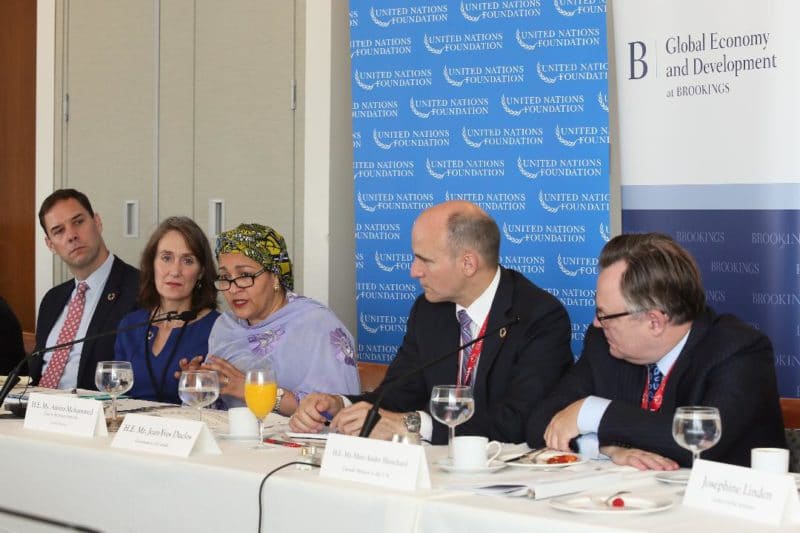The Nigeria’s N10.69 billion Sovereign Green Bond issued on Dec. 18, 2017, is the world’s first fully-certified sovereign green bond, UN Secretary-General Amina Mohammed has said.

Mohammed stated this on Monday, July 16, 2018 at the launch of a book: “‘From Summits to Solutions’: Innovations in Implementing the Sustainable Development Goals” at the UN headquarters in New York.
Green bonds, also known as climate bonds, are fixed income securities issued to finance projects that have positive impacts on the environment.
Nigeria was the first African country to issue a climate bond certified sovereign green bond, and world’s fourth sovereign issuer of green bonds
Mohammed, who is Nigeria’s immediate past Minister of Environment, is among the co-authors of the book’s 15 chapters, in conjunction with Simon Zadek, former co-director of UN Environment’s Inquiry on Sustainable Finance.
Chapter Three of the book entitled: “From Green Bonds to Sustainable Development: The Case of Nigeria”, was written by Mohammed, with Zadek, now of the UN Development Programme.
The chapter follows a unique narrative form in the book – it is told from the personal perspective of Mohammed, who served as Nigeria’s minister of the environment from November 2015 to February 2017.
In that role, the UN deputy chief collaborated with Zadek, and other colleagues to launch Nigeria’s first sovereign green bond, and they described many of the frontier issues tackled in that effort.
Their chapter offers a personal perspective on how Nigeria came to launch its first green bond as an innovative financing tool to tackle the country’s intersecting economic, social, environmental, and security challenges.
The UN deputy scribe said: “All the book’s authors deserve congratulations. Each chapter represents an important contribution to our thinking around capturing value, targeting places, and updating systems of governance.
“Let me also say how pleased I am that the volume’s opening contribution focuses on expanding women’s economic opportunities. It is important to remember women as an asset that are key to sustainable growth and development.
“The Nigerian Green Bond issuance experience is one such disruptive example.
“It is in fact the world’s first, fully-certified, Sovereign green bond, the topic of the essay I contributed to the volume launched here today, along with my co-author, Simon Zadek.
“Whilst the essay tells the fuller story, I want to highlight just a few points that I see as particularly salient to the sizeable challenge of realising the 2030 Agenda in a timely manner.
“Most directly, the green bond offered a new source of funds, front-loaded, to spend at the nexus between environmental protection, enterprise development (especially those that are women led) and Nigeria’s broader strategy of reducing its dependency on a fossil fuel intensive economy and contributing to its commitment in the Paris Agreement.
“The painful process helped us as a government to recognize our gaps and to take credit as sector for the hard-won agreement to have the Ministry of Finance ‘own’ the process and add the green bond to its balance sheet, was a means of engaging across the government in raising the importance of the nexus of green and economic success, and of strengthening the hand of the Ministry of Environment in cross-government strategic considerations and investments.
“More expansively, the process of developing and then issuing a green bond provided the opportunity for cross sector collaboration within government, opening partnerships and bringing awareness within the private financial community, including key capital market actors, of the opportunities that green investment present.
“In a nutshell, the green bond was a means of creating pathways towards the greater goal of engaging government and financial markets in the merits and opportunities associated with greening Nigeria’s economy, as well as being about raising some funds to invest in the here and now”.
Nigeria’s debut issuance of Green bonds was part of many efforts directed towards meeting its Paris Agreement on Climate Change’s Nationally Determined Contributions put at N142 billion by 2030.
The fully subscribed bond’s tenor is five years, and investors would receive a 13.48 per cent annual coupon, creating high expectations for the environmental projects linked to the government’s use of proceeds from the bond.
The UN deputy scribe said ‘Summits to Solutions’ provided cases we can learn from, not to replicate, but to draw insight as to how to advance practice in our own spheres of influence.
The launch of the book, edited by Raj Desai, Hiroshi Kato, Homi Kharas, and John McArthur, featured discourses by Deputy President of UN Foundation, Ms Elizabeth Cousens, ambassadors and representatives of Japan International Cooperation Agency and other UN partners.
By Prudence Arobani
